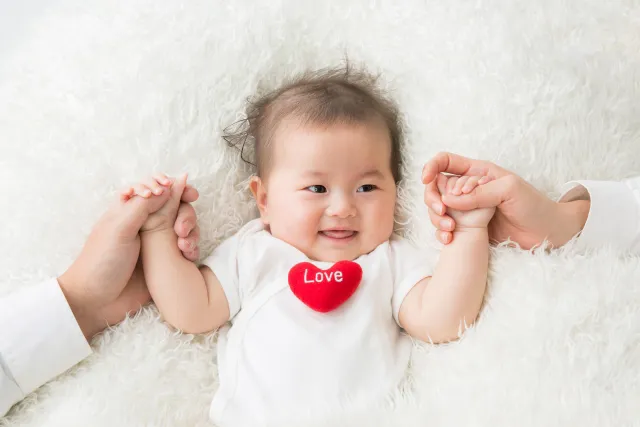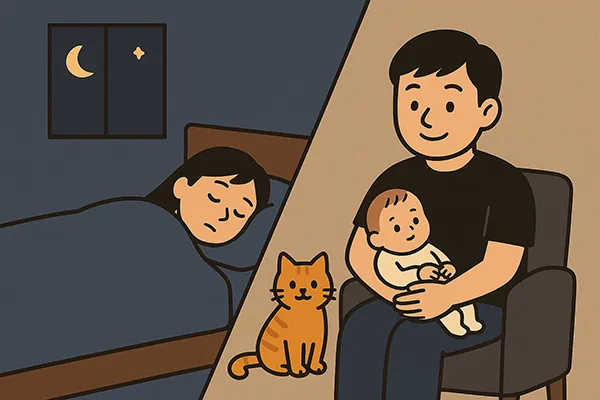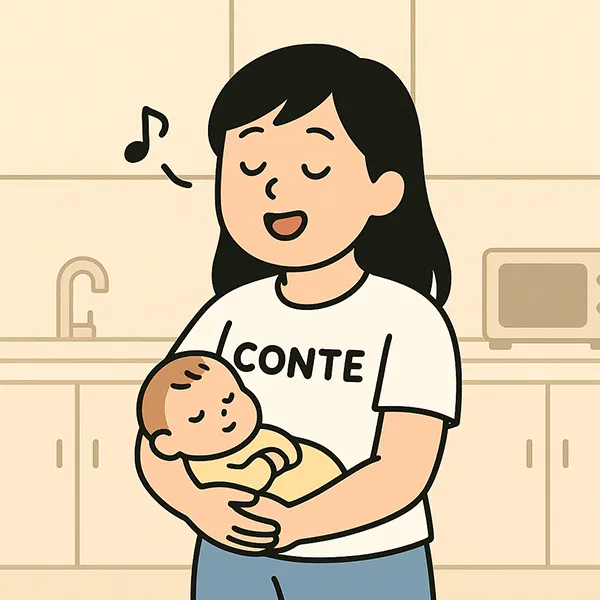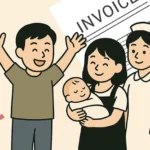It’s been six months since my daughter was born, and she’s growing up healthy and strong.
This time, I’d like to share my experience raising my first child at the age of 41.
Our life as new parents began after our daughter was discharged from the hospital, about three months after she was born.
I took three weeks of paternity leave starting from the day she came home.
Ideally, I would have liked to take around three months, but I had to consider my coworkers’ workload and our household income.
Looking back now, I think it would have been better if I had taken a little longer.
In Japan, fathers have the legal right to take childcare leave, just like mothers do.
If the employee requests it, the company cannot legally refuse.
According to 2023 data, the paternity leave uptake rate in Japan is around 30% overall.
In small and medium-sized companies like the one I work for, it’s only about 17%, which is relatively low compared to other countries.
Paternity Leave Around the World
| Country | Average Duration (for Fathers) | Take-up Rate (per 100 births) | Notes |
|---|---|---|---|
| Japan | About 1.5 months (46.5 days) | Around 30% | Many fathers take only a short leave |
| Sweden | About 34 weeks | Around 90% | Gender-equal and generous parental leave system |
| France | About 28 weeks | Around 70% | Both mothers and fathers commonly take leave |
| Germany | About 14 weeks | Around 70% | High participation among fathers |
| United States | None (no national paid leave) | Around 0% | No legally mandated paid parental leave |
| Australia | About 4 weeks | Around 20% | Parental leave system expanding |
Japan’s Parental Leave System
In Japan, either parent can take childcare leave until the child turns one year old.
During this period, the government provides financial support to help cover lost income.
Childcare Leave Benefits in Japan
| Period | Payment Rate |
|---|---|
| From the start of leave to 6 months | 67% of the employee’s regular salary (based on standard daily wage) |
| After 6 months | 50% of the employee’s regular salary |
When Parenting Began

For the first three days or so, my wife and I were completely overwhelmed—but above all, we were filled with happiness just to finally be living together with our daughter.
We didn’t really assign specific roles or divide responsibilities. Instead, we simply helped each other whenever and however we could.
If my wife was feeding the baby, I’d prepare the next bottle, wash and sterilize the used one, and we’d both take turns changing diapers and putting our daughter to sleep.
As for nighttime, before our daughter was born we used to sleep together in the same bedroom.
But after she came home from the hospital, we changed our routine—one of us would sleep in the bedroom downstairs, while the other stayed upstairs in the living room to care for the baby through the night.
In the beginning, we took turns. It just made more sense that at least one of us could get some proper sleep, rather than both of us being completely exhausted.

The End of My Paternity Leave
Three weeks went by in the blink of an eye, and my paternity leave came to an end.
Still, those weeks were some of the happiest and most meaningful days I’ve ever spent with my family.
Balancing Work and Parenting
After my paternity leave ended, I went back to work—but that didn’t mean parenting was over. From that point on, I had to juggle both work and childcare.
During the day, my wife takes care of our daughter while I’m at work. When I get home around 8 p.m., we switch roles so my wife can get some rest.
Although she usually doesn’t fall asleep until around 9 or 10 p.m., I take over baby duty from that time.
Once my daughter falls asleep, I sneak in a quick shower and stay up with her until around 1 a.m.
Then I pass the baton back to my wife and finally get some sleep myself.
Of course, this routine isn’t set in stone—if my wife looks especially tired, I’ll extend my shift or let her sleep through the night in the bedroom.
Fortunately, as our daughter reached four and five months, she started sleeping longer stretches at night.
She rarely wakes up crying from hunger anymore, which has made things a lot easier.
Still, since I wake up around 6 a.m. to get ready for work, I usually only sleep about five hours a night—which makes staying awake at the office pretty tough.
On Friday nights and Saturdays, since I don’t have work the next day, I often take care of our daughter through the night so my wife can finally get some solid sleep.
Six Months Old
Our daughter has grown so much—her first little teeth are starting to show, and she’s begun eating baby food.
She now sleeps through most of the night, except for one feeding, so lately my wife has been sleeping upstairs with her while I help out once or twice during the week and on weekends.
Our daily rhythm has finally started to settle down, and I feel like we’ve cleared “Parenting Level 1.”
I’m not sure how other families manage things, but this is how it’s been for us so far.
Thankfully, my wife’s mother and sisters sometimes come over to help her, which makes a big difference.
Recently, we were even able to leave our daughter at her grandparents’ house and go watch a movie together.
(The one we saw was One Battle After Another—it was pretty good, actually.)
How Much Time Do Japanese Fathers Spend on Housework and Childcare?
On average, Japanese men spend 9.3 hours per week on housework and childcare.
That works out to roughly 1 hour and 20 minutes per day.
I think most fathers are working, but this number feels a bit low yet. How about you?
My mother-in-law once sighed and said,
“In our generation, your father-in-law never helped with anything.”
Times really have changed.😅
The Hardest Part of Parenting So Far

Without a doubt — sleep. That’s it.
Feeding, baths, changing diapers — those are nothing compared to losing sleep.
Sure, my shoulders and back get sore from holding the baby all the time,
but what really wears you down is the lack of sleep.
When you don’t sleep enough, you lose all sense of calm and patience.
If you and your partner can find a good rhythm and share sleep time fairly, though, it becomes manageable.
After all, I want my wife to stay happy and in good spirits — that’s the most important thing for me.

A few years ago, my wife and I were still unsure whether we even wanted children.
Now that we have one, parenting is exactly what we imagined — a mix of exhaustion and joy.
To be honest (and maybe this sounds bad!), at this stage it’s like having an adorable but very demanding pet. 😅
But as she starts to stand, walk, and talk, I know things will only get more fun from here.
If we’d had a child in our 20s or early 30s, I probably wouldn’t have had this much emotional stability or patience.
Having a baby in my 40s might actually be one of the best things about this stage of life.
I’ll be sure to write again about how our daughter continues to grow.
Thanks for reading!
Discover Japanese Culture in Hands-On Workshops









